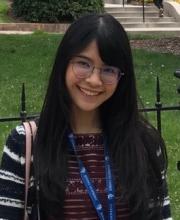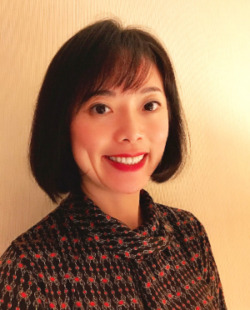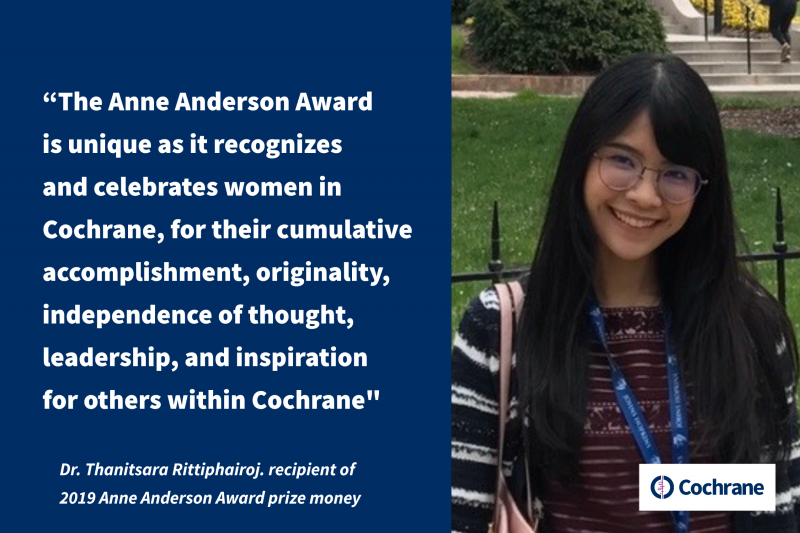
The Anne Anderson Award recognizes a female member of Cochrane who has made a significant contribution to the enhancement and visibility of women's participation within Cochrane. The winner then designates the cash award to assist a woman from a low-resource setting with her Cochrane activities. Here we speak to the recipient of the cash award from last year.
The Anne Anderson Award is one of severally prizes awarded annually. The goal of the Anne Anderson Award is to recognize and stimulate individuals contributing to the enhancement of women’s visibility and participation in Cochrane’s leadership. In the footsteps of Anne Anderson, many outstanding women continue to contribute and inspire other women to improve health knowledge for the good of their communities.
The Award recipient receives a plaque from Cochrane honouring her contributions at the annual Colloquium. She then designates the cash award of $3,000 USD to assist a woman from a low-resource setting with her Cochrane activities, who should eventually provide a brief written report on how the funds have been used.
 2019 Anne Anderson award winner, Tianjing Li nominated Dr. Thanitsara (Muky) Rittiphairoj from Thailand to receive the award money.
2019 Anne Anderson award winner, Tianjing Li nominated Dr. Thanitsara (Muky) Rittiphairoj from Thailand to receive the award money.
Dr. Thanitsara Rittiphairoj is a physician who works at a rural hospital in ‘Sa Kaeo’, a province located at the border of Thailand and Cambodia, and one of the lowest-resource settings in Thailand. She previously spent three years working at other rural hospitals in Eastern and Central Thailand. Dr. Thanitsara Rittiphairoj’s practice in these low-resource settings has been challenged not only by a shortage of medical supplies and healthcare professionals, but lack of infrastructure such as public transportations and roads that impedes access to care. These economically disadvantaged, poor, rural patients living in remote areas are at the highest risk for various diseases, which in turn, trap the communities in poverty. Dr. Rittiphairoj is committed to developing evidence-based healthcare recommendations to improve the healthcare for these patients across diverse low-resource settings.
Tianjing Li got to know Dr. Thanitsara Rittiphairoj 1.5 years ago when they worked together after she received the Prince Mahidol Award Youth Program scholarship from Prince Mahidol Award Foundation – the most prestigious scholarship in Thailand. As one of the five recipients of this award, she was funded to spend 12 months in the United States in pursing research, professional training, or community outreach. She elected to perform a systematic review on the effectiveness and safety of probiotics for glycemic control in patients with type 2 diabetes mellitus. Findings from this review will be used to inform clinical practice guidelines in Thailand. During this time, she also worked closely with faculty, staff, and students at the Cochrane Eyes and Vision United States Satellite which Tianjing directs. She is authoring a Cochrane systematic review titled “intravitreal steroid for diabetic macular edema”.
Dr. Thanitsara Rittiphairoj noted that “I have found this experience as one of my most valuable opportunities to learn how best professionals collaborate globally and synthesize evidence that is credible and accessible to all. Cochrane values diversity. Its mission to improve health and reduce disparity by using best available evidence resonates with me. As a newcomer to Cochrane, I am very eager to develop my research skills, collaborate with and learn from Cochrane experts. In this regard, the cash prize of Anne Anderson Award will support me in acquiring new skills in evidence synthesis methodology, which in turn will fulfill my commitment to the communities I serve in Thailand.”
We spoke to Dr. Thanitsara Rittiphairoj to find out her plans for the prize money.
How will receiving the prize money help you personally?
I am committed to developing effective evidence-based healthcare recommendations for patients across diverse low-resource settings in Thailand. Cochrane values diversity. Its mission to improve health and reduce disparity by using best available evidence resonates with me. This prize money will support me in acquiring new skills and in expanding my network of collaborators, for example, through attending the Cochrane Colloquium and other relevant trainings.
What are your future plans?
My long-term goal is to become a clinician scientist with a focus on developing evidence-based preventive healthcare recommendations in Thailand. In Fall 2020, I will join the Master of Public Health program at Harvard T.H. Chan School of Public Health. I also plan to pursue a doctoral degree afterwards. In the meantime, I will continue working with the Cochrane Eyes and Vision United States Satellite to further develop my expertise in evidence synthesis and in using systematic review evidence in formulating guideline recommendations.

What is your message to people thinking about submitting a nomination for the Anne Anderson Award?
It is a great way to pause and express gratitude. Nominating someone for an award gives you the same feeling. The Anne Anderson Award is unique as it recognizes and celebrates women in Cochrane, for their cumulative accomplishment, originality, independence of thought, leadership, and inspiration for others within Cochrane. The cash prize supports junior researchers like me from low-resource settings to accomplish what is impossible otherwise. I am very grateful for Dr. Tianjing Li for selecting me to receive the cash prize this year.

